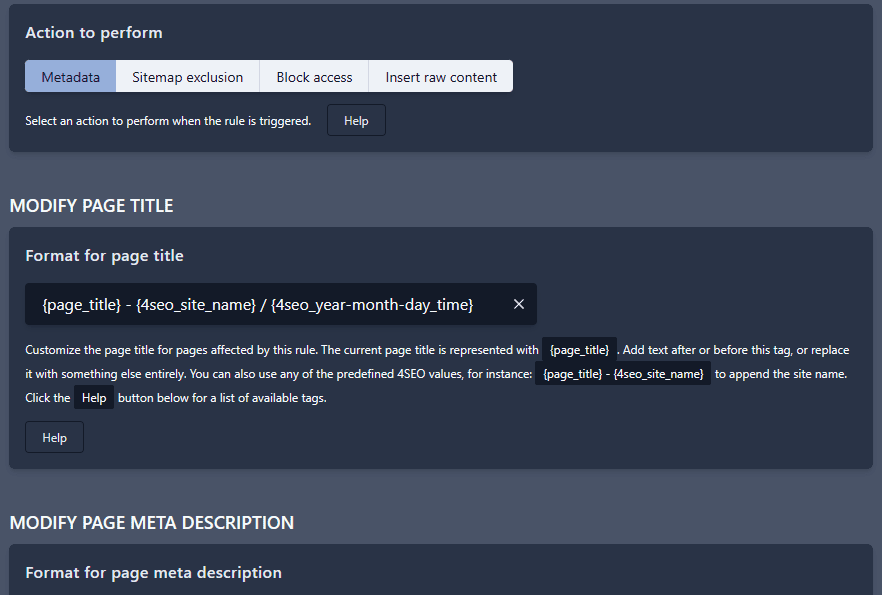
4SEO 4.5.0: make your life easier with these new features
Hi all,
We've been busy over the last couple of months adding several new features to 4SEO to make it both easier to use and extend its Search Engines Optimization capabilities to help you get more traffic.
4SEO version 4.5 is out today and there's the full changelog for it of course, but I wanted to get through the main improvements quickly in this post, with a focus on how these new or improved features can help you.
So here we go:
Customize page title and meta description on many pages with a metadata rule
One major addition to 4SEO 4.5.0 is to give you the ability to use patterns to customize automatically page title, meta description, robots tag or canonical with a new SEO rule type: metadata.
Being a 4SEO rule, all the actions below can be executed either on your whole site but also only on one or more pages. All the usual options are there to decide where to set these metadata:
- on one or more pages as defined by their address
- on some components
- on some categories
- depending on the value of a Joomla custom field
- after, before or between dates
Meta data for search engines
In the simplest form, you can now easily add something at the end of the page title of any page:
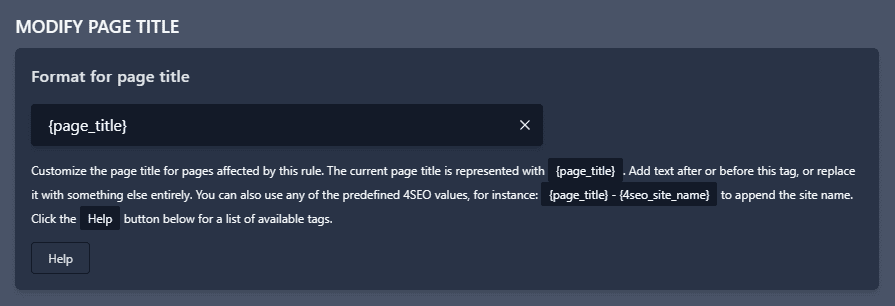
Simply add something to your page title, maybe a different keyword in different section of the site. For instance on the blog:
{page_title} - Weeblr blog
and on the shop:
{page_title} - Weeblr shop
It becomes more powerful using built-in 4SEO tags:
{page_title} - {4seo_year} - {4seo_site_name}
Metadata for Joomla e-commerce websites
And even more for e-commerce: you can build your meta description with product information. 4SEO now provides product name, brand, price and description as specific replacement tags, when on a J2Store or Hikashop product page:
{4seo_product_name} for {4seo_product_price} from {4seo_product_brand} {4seo_product_condition}
Using brand and price in the meta description is a common e-commerce trick to improve appearance in Google Search results, which you can now do extremely easily.
Search engines robots tag control
Of course, you can also control Google and Bing robots access:

Replace content only in page title or metadata, including social networks metada
This new 4SEO feature compliment in a way the previous one: you can now use the content replacer to replace content only in metadata:
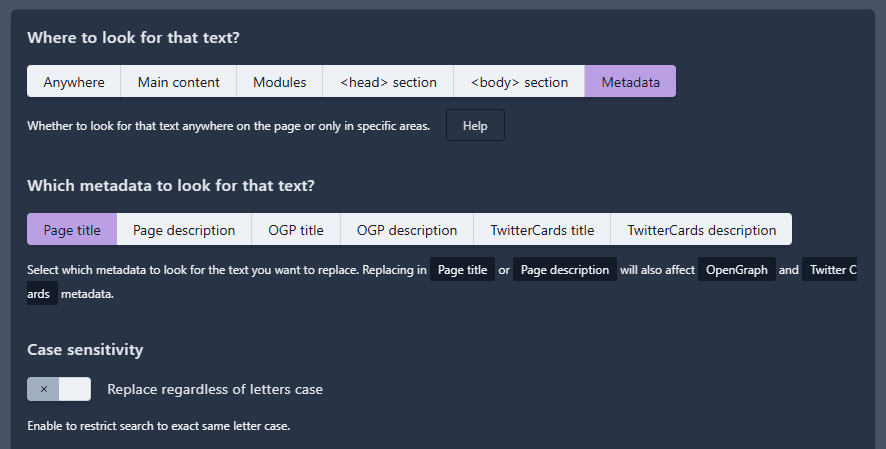
4SEO content replacer was able to replace some text only in specific part of a page already, including the <head> section, where all metadata normally exist.
You can now be even more specific, and replace content and tags only in the page title, description or, and that's the point, inside of OpenGraph and TwitterCards metadata.
OpenGraph is what's used to decide what to show when someone shares a page from your website on Facebook (Twitter Cards does the same for Twitter).
A typical use case? Replace some words with their hashtags when sharing on social media, but keep the original for search engines.
Enter separate metadata for search engine and social networks
Up to now, 4SEO would automatically generate OpenGraph and Twitter cards - to control sharing over Facebook and Twitter .
For that, it was re-using the regular page title and meta description used for search engine optimization. You can already manually customize these from 4SEO admin or from the frontend, but it was not possible to have separate title and description for search engines and for social networks. It's easy now, both in the admin and the frontend:
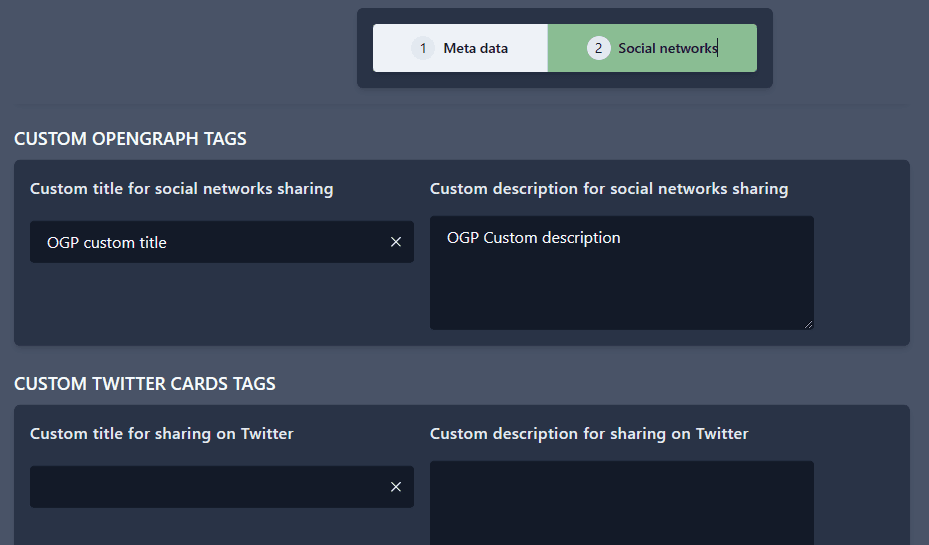
Reuse redirects in Joomla redirect component
Many Joomla users store one-to-one redirects in the Joomla redirect component. 4SEO provides a more powerful redirect facility but if you started using 4SEO only recently you may have many redirects stored in the redirect component.
Up to now, it was not possible to use at the same time 4SEO enhanced 404 error page and the Joomla redirect component.
Reason is simple: the Joomla redirect component is not really a redirect component, it can only redirect if a 404 error happens. That's useful but it means it does not fire if a 404 error is not triggered. If 4SEO enhanced error page is enabled, there's no more 404s, and therefore the Joomla redirect component is not triggered.
With 4SEO enhanced 404 error page, you can provide a better response to visitors when an error happens (not only a 404 by the way), so it's a very important feature and you do not want that disabled.
In 4SEO 4.5.0, we now check the redirect component list of redirects before displaying the enhanced error page, and run any that applies. That way, you can have best of both world. This feature is automatic, nothing to do for you.
Analyze a page immediately
Some of the most important features of 4SEO are based on the fact it runs a background analysis of your site. It starts from your home page, analyzes it, finds all the links and repeats the process of analyzing and finding links until there is no more links.
Well, in fact, it actually never stops and constantly monitors your site in case some new links appear in some page, or a page changes in one way or another. It can then analyze that page again if so. 4SEO never sleeps!
That's how it can:
- find all the pages that are visible on your site, for all components and extensions
- automatically identify canonical and duplicates pages
- locate broken links and tell exactly where they are
- and multiple other things.
But this has sometimes a drawback, especially on large sites: as it processes pages in the order it found them, it may have a backlog of pages not yet analyzed. And if you add a new article, it may be some time before that new article appears in the list of pages, and you can manually customize its metadata or social networks sharing information.
But no more: you can now manually enter the URL of a page, and 4SEO will analyze it right away:
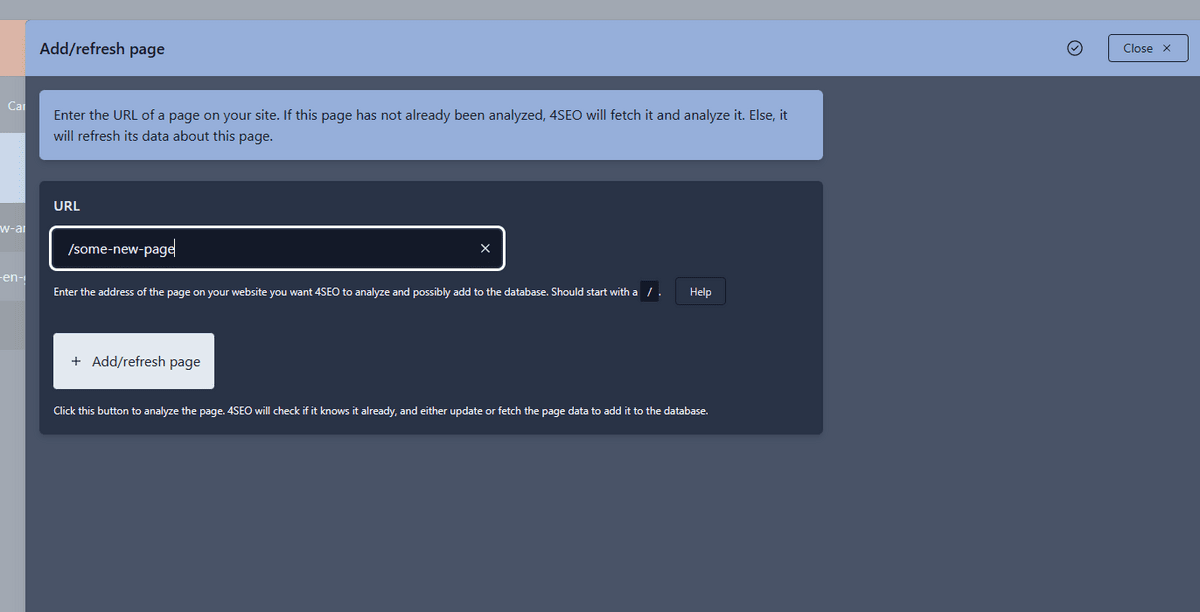
This can also be used to refresh immediately information of an existing page:
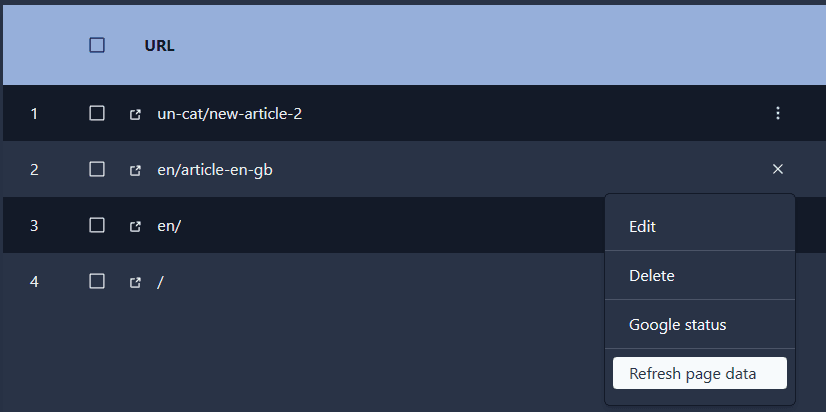
And it works the same on the frontend, so that you can inform 4SEO about a new page immediately after verifying it looks as you want it:
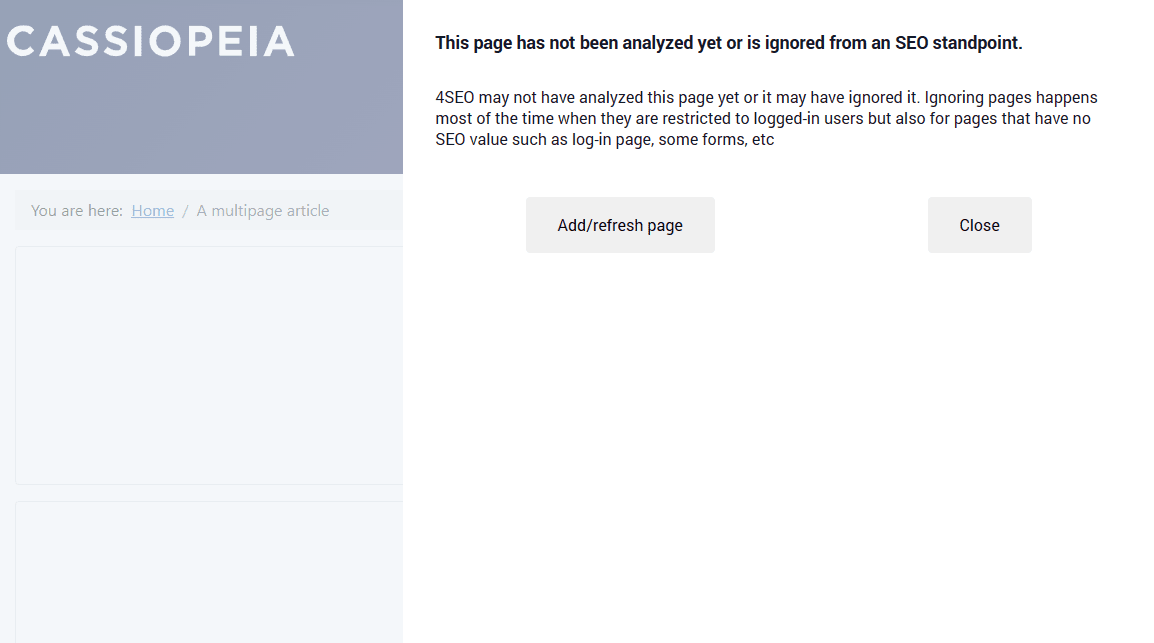
A new Lithuanian full translation
I believe using a software in your own language is the most important factor in ease of use. We can't provide 4SEO in as many languages as I'd like, but I'm proud to say that 4SEO is available already in Danish, Dutch, English, French, German, Italian, Polish, Russian, Slovak, Spanish and Turkish, thanks to the work of members of the Joomla community.
And thanks to Andrius Balsevičius, we now have a full Lithuanian translation as well!
If your language is not on the list, and you want to translate 4SEO, please be in touch.
And many other improvements
There's no point copy/pasting here this version changelog, you can find it in the documentation in all details, with all details.
That's it! Turns out this was a very long blog post and podcast episode, but 4SEO version 4.5.0 is a big release with many new feature, so I believe it's worth highlighting the most important ones here.
Don't worry though, there are still many things to add and improve in the future!
Cheers,
Yannick